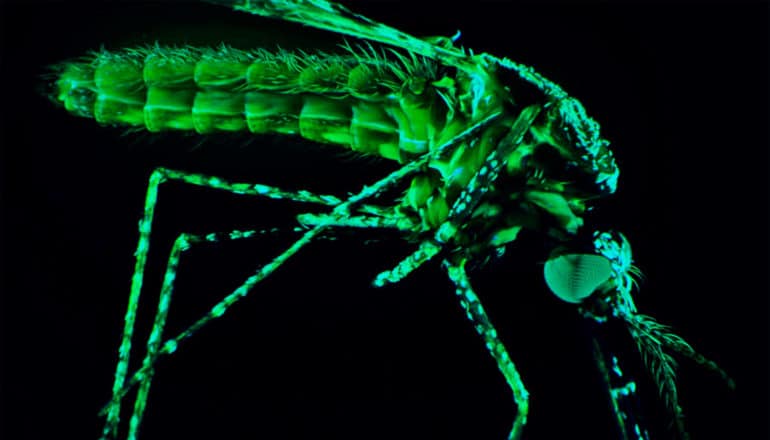
Researchers have developed small molecule compounds that rob mosquitoes of the ability to spread the malaria parasite, a new study shows.
The malaria parasite is a mutation expert. That allows it to become resistant to all known antimalarial treatments. So far, controlling the mosquito populations that spread the parasite between humans has been the only option.
Riding in the salivary glands of pregnant mosquitoes, the Plasmodium falciparum parasite gets into our skin when a mosquito bites us.
From there the parasite undergoes a series of transformations—adapting to grow in liver tissue where it adjusts to avoid our immune systems, invading and growing in our red blood cells, which eventually burst, spreading even more parasites.
When another mosquito bites a victim, that mosquito becomes infectious and the cycle goes on and on.
Killer malaria parasite
The malaria parasite only develops male and female forms, the so-called gametocytes, once inside the human body, but these don’t fertilize until they are in a mosquito’s stomach.
The new compounds knock out the plasmepsin V enzyme that the parasite needs to develop into gametocytes. And without gametocytes the parasite will simply get digested in the mosquito’s stomach and die there, preventing it from infecting the insect in the first place.
The researchers’ small molecule compounds act as “inhibitors,” knocking out the plasmepsin V enzyme, without which the gametocytes dies.
The discovery breaks new ground towards helping malaria elimination, says Justin Boddey, associate professor at the University of Melbourne and the Walter and Eliza Hall Institute (WEHI).
“It’s exciting to find that our inhibitors can target plasmepsin V in gametocytes and block transmission to the mosquito from occurring. Blocking the parasite from transmitting itself to mosquitoes is important for developing preventative therapies that stop the spread of disease.”
More than half a million people die from malaria every year. Plasmodium falciparum—the most lethal of all malaria parasites—is responsible for 90% of infection cases and deaths.
In Africa—which accounts for 94% of malaria deaths—P. falciparum is responsible for 99.7% of malaria infections.
New preventions and treatments are required that act across different stages of the malaria parasite’s complicated lifecycle—liver, blood, and gametocyte—the final transmission step back to the mosquito.
Gametocyte death
Using high-containment facilities, researchers bred malaria mosquitoes to study how gametocytes transmit from human blood to mosquito. They used gametocyte-specific fluorescent “tags” to observe how gametocytes hijack their host cell and develop inside by exporting effector proteins.
This highlighted the key part that plasmepsin V plays in export of gametocyte proteins and malaria parasite transmission, making this protease an effective drug target for killing the malaria parasite in both the asexual blood stage of its lifecycle, which is when malaria symptoms—fever, chills, muscle pain, and nausea—occur, and in gametocytes that spread disease via mosquitoes.
In collaboration with Vicky Avery, professor at Griffith University, the team used plasmepsin V inhibitors developed in 2015 to show that an optimal concentration killed young gametocytes.
However, a lower dose that allowed gametocytes to completely develop still blocked infection of mosquitoes at the WEHI Insectary.
“This shows that plasmepsin V is a target for transmission-blocking drugs,” Boddey says.
Enzyme’s dual role
Brad Sleebs, a chemical biologist at WEHI and University of Melbourne, says the enzyme proved an ideal drug target because of its importance for parasite survival at different stages of the malaria lifecycle.
“It’s encouraging to observe inhibitors that target plasmepsin V are effective against both the asexual blood and sexual transmission stages of the parasite’s lifecycle. Our research demonstrates that an antimalarial treatment targeting plasmepsin V has potential, not only in treatment of the disease, but also as a preventative population control measure.”
The research had been a great example of how basic and translational knowledge was established from new studies building on the last, Boddey says.
“It’s been a rewarding journey from identifying the function of plasmepsin V, to developing inhibitors that block it and kill asexual malaria parasites, to now validating this enzyme’s dual function as an effective blood stage and transmission-blocking drug target.”
What’s next?
Researchers are now turning their attention to the role of plasmepsin V in the remaining pillar of the malaria lifecycle: the liver stage.
“Our aim is to assess plasmepsin V as a multi-stage drug target for treating, as well as preventing, the spread of malaria; and to understand the unique biology occurring during liver infection,” Boddey says.
The paper appears in Cell Reports.
The researchers are collaborating with pharmaceutical company Merck and the Wellcome Trust to develop drugs targeting plasmepsin V in multiple parasite species. The Australian National Health and Medical Research Council of Australia, the CASS Foundation, and the Victorian Government funded the work.
Source: University of Melbourne
The post Compound keeps mosquitoes from spreading malaria parasite appeared first on Futurity.
from Futurity https://ift.tt/2Qd7M9T
No comments:
Post a Comment